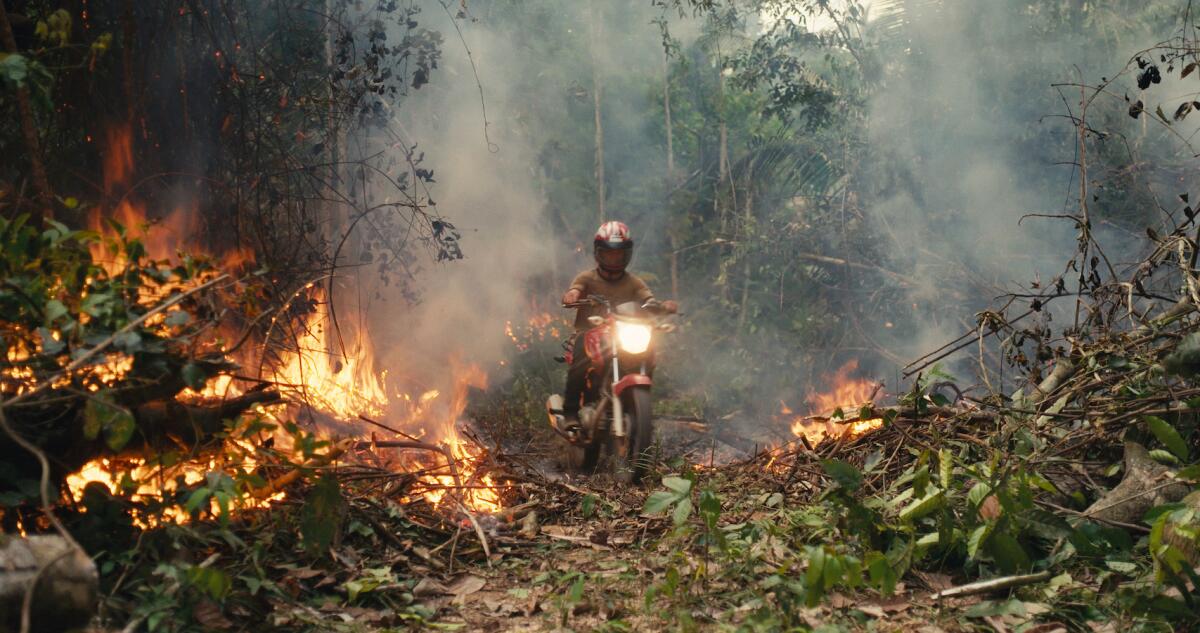Indigenous people turn to technology to save their Amazon home in ‘The Territory’

- Share via
By the time Alex Pritz’s documentary “The Territory” gets to a closeup of a sophisticated video camera carried holster-like by a young Indigenous man in Brazil fighting for the safety of his people and the forest that is their home, the purpose of the shot is clear. Bows and arrows can do only so much against invaders with chainsaws; when fending off deforestation, illegal colonization and harmful development, the camera needs to be a weapon too.
Until that point, “The Territory” has taken the lay of a threatened land with a vibrant, intimate eye and ear for its valuable splendor, and for the film’s Indigenous subjects, the Uru-eu-wau-wau, a proud people dwindling in number (fewer than 200 are left) as they try to protect a rainforest shrinking in size. Their newly elected 19-year-old leader is kind-faced, personable Bitaté, whose growing interest in 21st-century technological tools to tell the Uru-eu-wau-wau people’s story and record the crimes against them and the planet’s ecological health gives this grim, uneven conflict a shred of hope.
For your safety
The Times is committed to reviewing theatrical film releases during the COVID-19 pandemic. Because moviegoing carries risks during this time, we remind readers to follow health and safety guidelines as outlined by the CDC and local health officials.
This vérité-driven advocacy documentary is distinctively on their side, its occasional glimpse of trudging insects and ants carting food not just signs of forest beauty but potent metaphors for heavy lifting and uphill battles. According to one of the film’s central characters, environmental activist Neidinha Bandeira, who has spent decades protecting Indigenous sovereignty, the Uru-eu-wau-wau are a last defense before the Amazon completely gives way to industrial ranching, logging, mining and urban encroachment.
But Pritz — with his first feature after years as a documentary cinematographer and activist — also introduces us to a couple of those wannabe settlers. They’re men beholden to a vision of conquest, ownership and development they see as a God-given destiny shielded by the freshly elected (as of 2018) government of the fascistic Jair Bolsonaro, openly hostile to the rights of the Indigenous. For middle-aged Sergio, a gentle-seeming figure who heads an association of small farmers primed to claim land, it’s about a piece of earth to call his own after years toiling for others. To him, the Uru-eu-wau-wau do nothing and have too much. The scarier version of that misguided view is venal landgrabber Martins, who seems to relish sawing and burning his way toward some warped version of “progress.”
The result is a kind of inverted western as it’s happening, albeit giving its “pioneer” villains more voice than this myth-centric American genre ever gave the natives it routinely portrayed as antagonists. Violence against the Uru-eu-wau-wau and their allies, meanwhile, is ever-present. The cut in a falling tree opening like a screaming maw is another version of harrowing too, and the denuded sections on the edge of their territory — captured in shots from the drone cameras they’re learning to use — look like diseased scabs against the surrounding green. The careful sound design does its part, ensuring we associate harshness (buzzsaws, engines, crashing) with the aggressors, and the hush of running water, creatures and human community with our Indigenous heroes.
As conscientious as Pritz is about being the helpful outsider with someone else’s story, he isn’t always clear about the nuances of laws, violations and politics in play, often preferring the snap of evocative visuals when informational context would help. And the last act’s calculated aim to leave the viewer optimistic — driven by Bitaté’s image-savvy leadership and active response to invaders — is also a curious choice when deforestation and displacement are still raging in the Amazon.
It assuredly can’t be easy for a filmmaker to choose whether to leave viewers motivated by warmth or woe. Yet your capacity to be both awed and enraged is ultimately well-served by “The Territory,” a gripping portrait of an endangered community for whom nature is both their precious environment and the facet of humanity that can all too easily be turned malicious.
'The Territory'
In Brazilian Portuguese and Tupi-Kawahiva with English subtitles
Rating: PG for thematic material, some smoking, brief nudity and language
Running time: 1 hour, 23 minutes
Playing: Starts Aug. 19, Laemmle Monica, Santa Monica; AMC Burbank 16
More to Read
Only good movies
Get the Indie Focus newsletter, Mark Olsen's weekly guide to the world of cinema.
You may occasionally receive promotional content from the Los Angeles Times.







